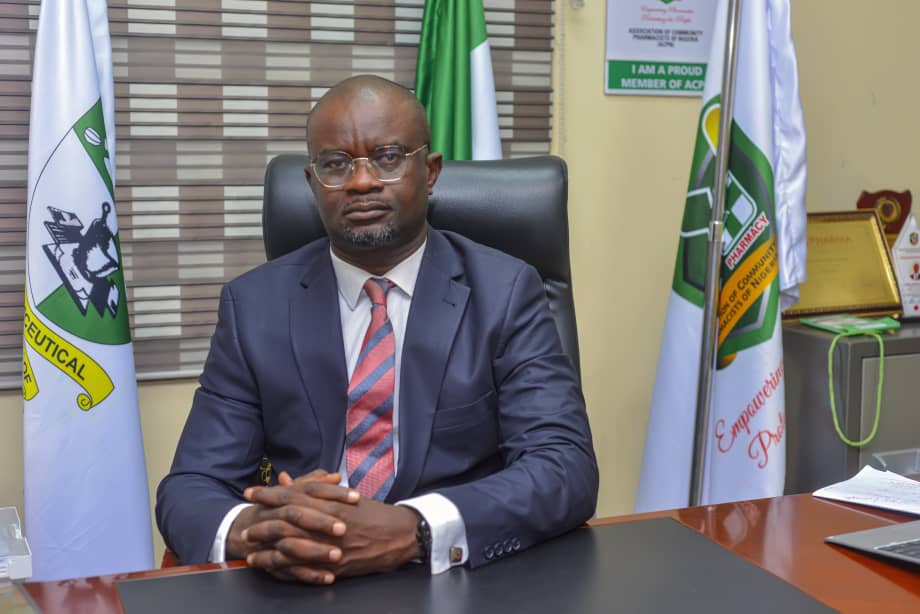
ACPN to hold 44th Annual International Conference in Awka, commends Nigerian pharmaceutical manufacturers
…..discusses pharma industry growth and challenges
By Primetime Reports

The Association of Community Pharmacists of Nigeria (ACPN) is set to hold its 44th Annual National Conference in Awka, Anambra State. The conference will feature discussions on the pharmaceutical industry’s growth, challenges, and potential solutions. Key topics include drug security, local manufacturing, and government support.
The ACPN emphasizes the need for better sanctions against drug faking and a stronger legal framework to promote a wholesome pharmaceutical sector. They also highlight the importance of government incentives for local manufacturers and the potential for Nigeria to benefit from the African Free Trade Continental Area. Additionally, the ACPN expresses concerns about the dominance of physicians in the healthcare sector and advocates for greater recognition of pharmacists’ roles and skills.
As the Association of Community Pharmacists of Nigeria (ACPN) prepares for its 44th Annual National Conference in Awka, Anambra State, between July 22 and 27, newsmen spoke to the duo of National Chairman ACPN Pharm Ambrose Ezeh MAW, DCPharm, and National Secretary Omokhafe Ashore, FPSN, on contemporary health matters.
Excerpts:
Reporters: In your recent pre-conference press briefing, you spoke about the high incidence of drug faking and a need for a better sanction culture. How then can we grow the pharma sector against this background?
Association of Community Pharmacists of Nigeria (ACPN): Please make no mistake about it. The pharma industry continues to grow despite all odds, with over 150 registered pharma manufacturers, including 5 that are WHO certified for Good Manufacturing Practice (GMP).
I can confirm to you that local pharma manufacturers, including prominent Nigerian investors, are building Active Pharmaceutical Ingredient (API) plants, which are in the tens of millions of dollars range investments, in a bid to change the structure of the game as we impose medicine/drug security in Nigeria as well as create a local manufacturing hub in Africa.
You will recollect the exploits of Fidson Healthcare in the manufacture of anti-retrovirals at a time donor agencies are withdrawing funding that guaranteed a free supply of these drugs to Nigerians. Emzor commissioned a specialized cephalosporin plant in its ultra-modern factory a few months ago, while Indian giant Jawa Pharm also recently inaugurated a factory site for the beta-lactam range of anti-infectives.
At some point the value of our industry was estimated to be about $2 billion, but with recent investments we would be cruising to an ambitious $10 billion dollar range sector in the next five years, especially now that Codix Healthcare recently launched a factory for the local manufacture of in vitro diagnostic kits and medical consumables.
Despite challenges, we are certainly unrelenting and will continue to be fruitful to contribute significantly to the national gross domestic product (GDP), like we see in India and China, where the pharma sector remains very strategic to national growth and development.
The ACPN will partner with the local pharma industry to attain increased access to drugs and economic viability of the sector.
The government at all levels must support pharma manufacturers through a deliberate special incentive for the pharma industry to facilitate access to equipment, excipients, and other materials that are expedient to GMP because local manufacture presents opportunities for more jobs, international trade, economic growth and development, and boosting national security.
We must make Nigeria benefit maximally from the African Free Trade Continental Area (AFTCA), which is adjudged as one of the largest in the world.
When we create the environment for the listed goals, we can easily meet the goals of both the National Drug Policy 2021 and the National Health Policy, which both prioritize the availability, accessibility, and affordability of safe and efficacious drugs in our health system.
This is why we reiterate, albeit with a sense of responsibility, that the Federal Ministry of Health (FMoH) must reach out more to stakeholders in pharmacy practice and industry before churning out policies like it did with MEDIPOOL.
We hasten to say that a policy can be good or bad depending on its implementation mode, particularly when we set out clear rules of engagement with relevant players in affected constituencies.
Our industry once contemplated an Expedited Medicine Access Program akin to the bulk supply of local drugs in a central template, like it happened in the PTF era.
It is therefore important that the FMoH promote reforms and a strengthened legal framework through an amendment of the Fake Drug Act by bringing heavier sanctions on defaulters of the law while also implementing the approved National Drug Distribution Guidelines of 2015 for maximum effect.
A progressive implementation of these shared values will be the springboard for a wholesome and virile pharma sector.
2) In the last few months there has been a renewed wave of media rows between pharmacy groups and stakeholders in medicine. What is the crux of the matter?
ACPN: It is unfortunate to say this, but the reality remains that these fellows you described as stakeholders in medicine have been existential adversaries to our aspirations and destiny as a profession.
The philosophy of these medical groups is grounded in a diabolical spirit of mesmerism, which the government falls for at both the federal and state levels.
Let me say with deep conviction that these physicians have been succeeding in episodes of tainted development in the health sector because of a distinct subservience on the part of the government, and I will give empirical data to support this.
Nigerian physicians under the banner of the Nigerian Medical Association (NMA) and some other sub-professional interests recently pointedly called on the federal government to withdraw the reviewed circulars for allowances for different cadres of healthcare workers in Nigeria and have threatened to go on strike in 21 days if the government does not accede to their spurious demands. From a lawful perspective of labor laws in Nigeria, which have also been affirmed by the National Industrial Court of Nigeria (NICN), the law does not recognize a 21-day ultimatum for those in emergency services, which any healthcare association/union falls within in terms of bracketization. It is not my responsibility to teach these dwarfs labor laws since the only area of life they are familiar with is their core area of practice.
Realistically, as it stands today, there is no ultimatum before the government from any of the groups that symbolize medical interest.
A recent panic alert issued by the Association of Nigeria Private Medical Practitioners (ANPMP) is absolutely unnecessary and uncalled for.
As usual, the basis of the hues and cries of the medical groups is vested in privileges and benefit packages. One of the areas of their needless confrontation is the government recognition of PharmD and consultant cadre in pharmacy practice, which they claim undermines clinical skills and output of physicians in healthcare, a position that is as senseless as it is meaningless because a Nigerian version of healthcare will not be a benchmark for healthcare practice in a decent world.
I am a critical stakeholder, and I am worried because government at all levels is courting a violent disaster as it continues to overindulge these physicians who are government employees who demand what they want and proceed to put a ceiling on what all others can get, including not recognizing certified skills acquisition paid for by pharmacists in millions of naira (between 5 and 7.5 million naira for the 5.5-year duration of the fellowship program, which leads to granting consultant cadre, when doctors are on government scholarship through medical residency programs that were instituted by FMoH). In Nigeria today, all FHIs have continually frustrated the implementation of the residency program circular approved by the FMoH on the prompting of the Pharmaceutical Society of Nigeria (PSN) in June 2015, more than 10 years ago. In apartheid Nigeria, pharmacists who spend their hard-earned money to acquire skills through the fellowship program are forced to pay by the management of FHIs in pursuance of their residency programs as part of strategies to frustrate them, while physicians who the government paid for elope (JAPA) a few months after utilizing taxpayers’s money for their training, thus shortchanging Nigeria perennially.
Global best practices and all modern tenets of skill acquisition or manpower development modes advocate an ability to potentiate potentials for improved competencies and boost in service delivery.
With the active connivance of the government, physicians are the only people DECREED to be CMD/CEOs of Federal Health Institutions (FHIs), Chairman-Medical Advisory Committees (C+MAC), and a full plethora of deputies who are all physicians.
In the last few months, the government keeps expanding the range of designated universities of medicine and attempts to mutilate the configuration in the health sector by placing faculties of pharmacies in university systems designed to have only physician-VCs. This is a distorted equation that imposes psychological atrophy on pharmacy and other student health professionals from the beginning of their careers.
Government continues to expand the latitude of influence of physicians who insist every title, office, or privilege in healthcare must be mutually exclusive to members of the Nigeria Medical Association (NMA). Today there are 5 physicians in charge of non-health-related ministries, including the Education Ministry, without protest by stakeholders in these callings.
The education minister, a very inexperienced physician who was causing chaos at FMoH with his infamous policy drives, has in less than 6 months disrupted the processes for the appointment of new VCs at UNIZik, UNICAL, and UNIUYO because consultant physicians (his physician colleagues) under the aegis of the Medical and Dental Consultant Association (MDCAN) proceeded on strike to compel the federal government to allow them to participate in the selection process for VCs contrary to the NUC Act, which dictates that holders of the office of VCs must have PhDs because it is an ACADEMIC and not a PROFESSIONAL calling.
Physicians, it must be declared, have now established a unity of monolith in alliance with the government to subsume the liberties of all other health workers in dangerously unprecedented political phoenixism in Nigeria.
What does anybody expect with the visionless appointments of 7 physicians (2 of them are in charge of the FMoH), a special adviser on health matters, and CEOs of the main MDAs in the health sector (NHIA, NPHDA, NACA, NCDC, and others) but fruitlessness in a multidisciplinary sector?
Prof. Pate arrived at the FMOH stressing a political catharsis that he was given a mandate to create hibernation from the unending conflicts amongst health professionals and workers, but he has entrenched a belief system that compels an average non-physician health worker to suspect his motives as Coordinating Minister alongside his band of delusional messiahs in all spheres of healthcare.
President Tinubu might have given slim hopes in the area of infrastructural development, agriculture, and internal affairs, particularly immigration, but what he is institutionalizing in healthcare is a usurpation of the authoritative exclusivity of all non-physician health professionals by physicians.
Given the scenario, physicians through the NMA are now officially at the National Assembly (NASS) to legitimately wrestle to claim the professional autonomy of all other professions in Nigeria, with an ill-conceived NHFRA bill having failed to achieve that 11 years ago with the National Health Act and a failed legal bid at the FHC, Abuja, by the MDCAN, which brazenly requested the NASS to hands off enacting regulatory laws to pave the way for MDCAN to take over such regulatory functions.
In Lagos State, where I practice, Governor Sanwo-Olu’s wife, who is a physician, in collaboration with the Ministry of Health, has perfected a parallel to the distasteful state of affairs at the federal level.
Lagos State is the only Southwest state that has refused to formalize its Consultant Cadre circular because all the relevant implementing officers in Lagos State Government will not dare incur the wrath of Madam, who the emperors that epitomize the leadership of medical stakeholders have sworn must ensure symphonies of progress, which the consultant cadre in pharmacy represents, are obliterated.
For us in pharmacy, we rely on the Solvito Ambulando principle, which believes there will be a solution as long as you keep moving.
Physicians mouth sustenance of hierarchies in the health sector, but it is pharmacists who have been seriously shortchanged because up to 1990, pharmacists and doctors started their careers on the same grade level during internship and after youth service, contrary to a 2-grade level differential today. The existing contraption is one of the unholy legacies of the late Olikoye Kuti, an infamous health minister in the 80s, in the reckoning.
We call on the 4 trade unions under the umbrella of the Joint Health Section Union (JOHESU) and the Assembly of Healthcare Professional Associations (AHPA) connected to JOHESU to be prepared. It is time to expose the congressional hypocrisy of those who allow the rot and madness with regard to the unproductive leadership in health to continue to thrive.
We must go all the way this time, albeit legitimately, to prove the point that when injustice becomes law, resistance becomes a duty.
It has become imperative to challenge the unconstitutional proviso that grants exclusive privileges to physicians who are not trained health administrators to be CEOs of all the FHIs in Nigeria.
If the federal government is sensitive and responsive enough, it must hold serious dialogue with non-physician health professionals and workers immediately because they are over 80% of the workforce. Such engagements may, however, not be respected under the auspices of the leadership of the FMoH, which has refused to inaugurate the boards of the professional regulatory councils and FHIs under the guise that their enabling laws are under review in a process that does not recognize the major players in the law review of their professional practice or their stakes in the hospitals they work in.
The PSN and JOHESU are in the best position to coordinate this advocated dialogue directly under a President Tinubu-led initiative.
The impunities and the resulting conundrum at FMOH need a pathological and not a mere symptomatic change or intervention.
For me, I am relying on the imperatives of scripture, which say, “All the trees of the forest will know that I, the Lord, bring down the tall tree and make the low tree grow tall. I dry up the green tree and make the dry tree flourish.” I, the Lord, have spoken, and I will do it.”
3. Independent: There is a new National Health Facility Regulatory bill before the Senate. Is this acceptable to the ACPN and the generality of pharmacists?
ACPN: JUSTIFICATION FOR NOT MERGING THE PHARMACY COUNCIL OF NIGERIA (PCN).
We have looked at the legal background and development of pharmacy regulatory laws in the country, beginning with the Lagos Pilotage and Harbour Ordinance of 1878, the Hospital Ordinance of 1881, and the Ereko Dispensary Rules of 1889. These early legislations recognized the purpose of regulating dispensers, druggists, and chemists. The regulation of the practice of the profession in that regard was overseen by the Pharmacists Board as contained in the Pharmacy Ordinance of 1927, the Poisons and Pharmacy Act 152 of 1958, and the Pharmacists Act No. 26 of 1964. Despite changes in the contents of the legislation, the substances were basically the same. Decree No. 91 of 1992 created the Pharmacists Council of Nigeria, which was further improved upon by the Pharmacists Council of Nigeria Act Cap P17 LFN 2004. The current extant legislation, the Pharmacy Council of Nigeria (Establishment) Act 2022, not only emboldened the previous legislation but also substantially expanded the scope of practice and personnel involved in the practice and brought the law to be on par with the best international practice.
Pharmacy practice and business has been the subject of legislation and regulation by the council. We provide further justifications below as to why the Pharmacy Council of Nigeria should not be merged with any other health regulatory body or bodies in the country.
The Pharmacy Council of Nigeria has undergone phenomenal development and growth in the performance of its duty as regulator of pharmacy practice, premises, and personnel. It currently has developed its regulatory personnel and structure to such an extent that it is well entrenched with state offices in each state of the Federation, 8 zonal offices in each of the geopolitical zones, Lagos and Abuja as special zonal offices, and its head office/registry in Abuja. These physical structures, manned by staff who have acquired capacity in regulatory activities over the years, have adequately reached a stage whereby the Council is now effectively regulating the drug distribution system in the country.
Due to the effectiveness of the pharmacy under the new dispensation, the World Health Organization benchmarked Nigeria as having attained Maturity Level 3 along with NAFDAC, which are the agencies jointly recognized as the National Regulatory Agency for Nigeria. With this rating, Nigeria is now rated one of the very few in Africa with that capacity. The national regulatory authorities have been found to have a well-functioning and integrated system to facilitate regulation and thus can effectively ensure that the country produces vaccines, among others.
International Best Practice and Alignment with Global Standards: It is the general practice globally that the pharmacy profession, practice, and business are regulated exclusively by the practitioners of the profession as an entity. We looked at the practice environment in countries with similar backgrounds to Nigeria, including Great Britain, the United States of America, Canada, the Republic of South Africa, Ghana, and Kenya. These countries each have a pharmacy regulatory body as the sole sector regulator.
Preservation of Professional Standards: The pharmacy profession has unique ethical and practice standards that require focused regulation. A merger could lead to generic regulation that fails to address the specific challenges faced by pharmacists and other cadres of the pharmacy profession, thereby lowering professional standards and impacting the quality of pharmaceutical services provided to the public.
Prevention of Bureaucratic Overload and Resource Misallocation: Combining multiple regulatory bodies could lead to unnecessary bureaucracy and inefficient resource allocation. Pharmacy-specific functions may be underfunded or neglected, as the regulatory focus becomes divided across various health professions. This could undermine the effectiveness of pharmacy regulation and weaken the profession’s ability to protect public health with respect to the drug component of same.




